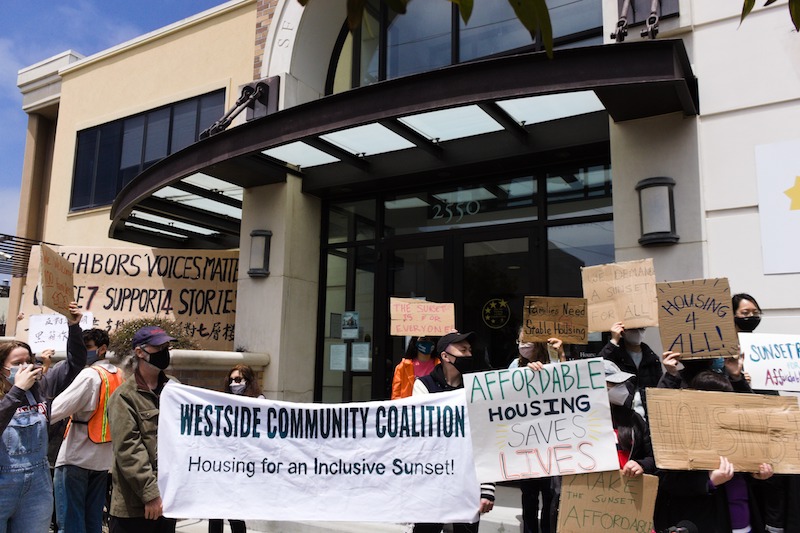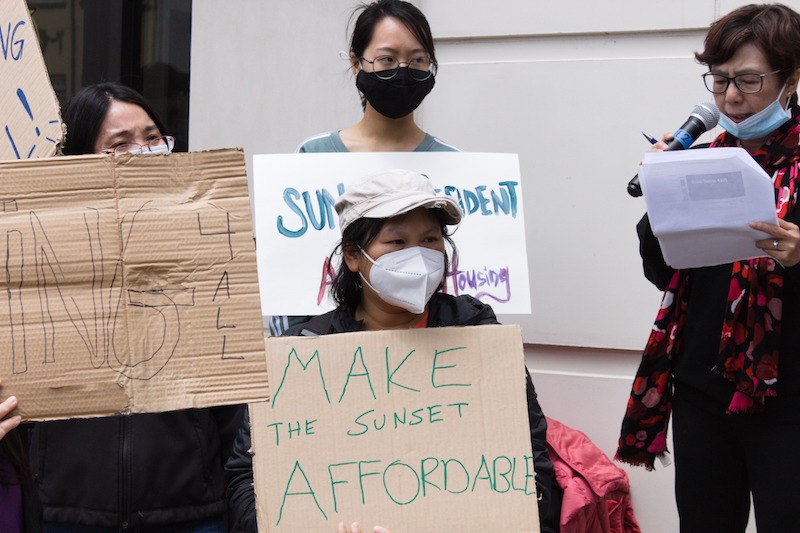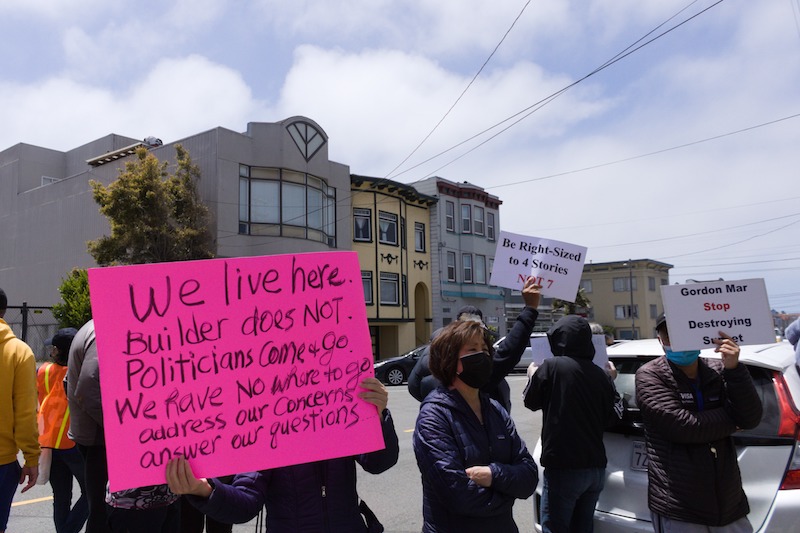Tensions were high at a 100-person rally Saturday afternoon at 2550 Irving Street, the site of a hotly-contested affordable housing development scheduled to break ground in 2023, with proponents of the site speaking to the desperate need for affordable housing in San Francisco, and opponents shouting “liar, liar, liar!”
Currently the location of a Police Credit Union branch, the project, which will be constructed by non-profit developer Tenderloin Neighborhood Development Corporation, is currently proposed as a seven story building with 100 units of 100 percent affordable housing, ranging from studios to three bedroom units targeted towards households making between $38,000 and $102,000 a year, and with commercial office space on the first floor.

So far, $15 million of money from 2019’s Prop A, which authorized the City to issue up to $600 million in local bonds to fund affordable housing, has been earmarked by the Mayor’s Office of Housing and Community Development for the 2550 Irving project.
According to District 4 Supervisor Mar, who campaigned on bringing affordable housing to the Sunset District, the project is primarily focused on welcoming lower income families into the neighborhood, which is known for its high quality schools, parks, shops, and restaurants, all of them within walking distance of the site. Golden Gate Park is one block away.

“Expanding affordable housing in the Sunset and on the west side is my top priority as supervisor…I am committed to seeing this affordable family housing project move forward as quickly as possible and I am also committed to identifying and supporting additional 100 percent affordable housing projects in the Sunset,” said Mar.
Katie Lamont, senior director of housing development for the TNDC, said there is local political will to develop affordable housing units in “communities of opportunity,” which are neighborhoods that have access to services typically more available in affluent areas. In fact, Prop A specifically states the importance of expanding affordable housing in areas which have previously not seen much affordable housing development, according to Lamont.
But the project faces opposition from nearby District 4 residents, who say that they will be negatively impacted by the development.

Linda Tang, who lives in the Sunset, said that she is concerned that adding 100 units of housing in the neighborhood would exacerbate overcrowding on the already-busy N line, which services Irving Street.
“If you go to 19th Street, you can’t even get on the bus,” said Tang.
Tang added that the 100 additional housing units could impact nearby seniors, who depend on their vehicles to get groceries and park closer to their homes to bring those groceries in. Tang said that she would be willing to have the 2550 Irving development be seven stories if the parking issue was resolved—the development only has 11 parking spots currently planned.
“It’s so hard to park around here. They need to have more parking space, we are not against affordable housing, we just need more parking space,” said Tang.
But some Sunset district residents support the development at 2550 Irving St.
“I would like as many people to benefit as possible…I understand my neighbors’ concerns… but this is a wonderful neighborhood, it’s family-oriented, there’s access to the park, why shouldn’t everyone benefit from that?” said Leslie Roffman, a retired preschool teacher who lives in a house a few blocks from the development. “I want other people to have a safe, stable home. I think we have to be willing to do that because it’s so un-affordable in San Francisco.”
Others living outside the Sunset laud the project as necessary to address high San Francisco rents and the toll it places on lower-income families.
Ah Yu, a mother who currently lives in Chinatown and works three part-time jobs to support her family, said that affordable housing projects like this one are crucial to give her children a better upbringing.
“My children always ask me ‘when will I get my own room, my own bed?’,” said Yu in Cantonese. “As a mother, I am saddened that I cannot provide a stable environment for my children.”
Proponents of the development who were present at the rally agree that more parking and more transit service is needed, but rather than limit the number of units to solve the issue, they want the TNDC to commit to the proposed 100 affordable units, and then go even further.
The Westside Community Coalition, a group of several organizations advocating for more affordable housing developments in San Francisco, want the rents for be affordable for families earning 30 percent of the Area Media Income, equivalent to $36,720 per year, rather than the currently proposed 80 percent AMI, equivalent to a household income of $102,000 per year. They also want the first floor to be available to nonprofit services, rather than commercial offices as is currently outlined for the project, and to construct an underground parking lot for building residents to prevent congested street parking.
Aloe Lai, a member of the Tenderloin Housing Clinic and the WCC, said that they believe that this project is about fighting gentrification in a neighborhood which has a large number of homeowners and high property values, and ensuring that lower-income San Franciscans have an opportunity to live in areas with nice schools, parks, and shopping areas.
“I think it would enhance so much about the city and enable people to be more stable for housing if we pushed for affordable housing here…the house across the street is being sold for $1.5 million, if that’s housing in the Sunset right now, then I have to push for this because every day people are being pushed out,” said Lai.
As for underground parking though, Lamont said that it is unlikely that underground parking will be feasible due to the expense of creating underground parking lots as well as the existing funding challenges this affordable housing development brought about by the development’s size, which is smaller than most 100 percent affordable housing sites, making it hard to finance.
“Anything is feasible if you have the money,” Lamont said, chuckling. “The question is how much would it cost…and does the amount of space that parking takes up compared to how much space an apartment home takes up, plus the cost of constructing it, which is exponentially more if its underground, make sense?” said Lamont.
According to Lamont, calls to make the development smaller from opponents of the development are unlikely to bear fruit because the budget for this development is already tight, due an inherent trade-off between affordability and volume for apartment buildings, particularly because of the desire to have the property well maintained; the cheaper the average rent per unit, the more units you need to make the property financially feasible.
“Over the long term, you need a critical mass of homes that can provide enough income to pay the salaries of people to manage it, maintain it, and provide services,” said Lamont. “If you’re going to have low rents you typically need to have more homes.”
As far as resolving the issue of crowded buses on the N Judah line, which would likely be used by residents of the 2550 Irving development, it is largely out of the TNDC’s hands, but Mar said that both the County Transportation Authority and the SFMTA are currently looking into solutions, pointing to the District 4 Mobility Study by the CTA and the N Judah Rapid proposal, as part of the MTA’s “Muni forward” project.
The District 4 Mobility Study, called for by Mar, who sits on the Transportation Authority Board, seeks to identify routes in District 4 with heavy use of single occupancy vehicles and explore strategies involving bike lanes and expansion of public transit to reduce the number of cars on the road in those areas.
The N Judah Rapid proposal, on the other hand, would seek to reduce N-Judah stops at intersections, extend boarding islands at 13 intersections, and reduce the number of stops of the N-Judah from every 2-3 blocks to every 3-4 blocks to get the N-Judah line through the corridor faster.
“I understand the concerns raised by some residents how this project will exacerbate already-existing challenges in the neighborhood, including inadequate public transit, but it’s an issue we’re addressing separate from the project,” said Mar.
The SFMTA could not be immediately reached for comment.
For those who want to share input on the housing project with Supervisor Mar’s office, they can email Mar’s legislative aide, Daisy Quan, who deals with housing development policy, at daisy.quan@sfgov.org.






